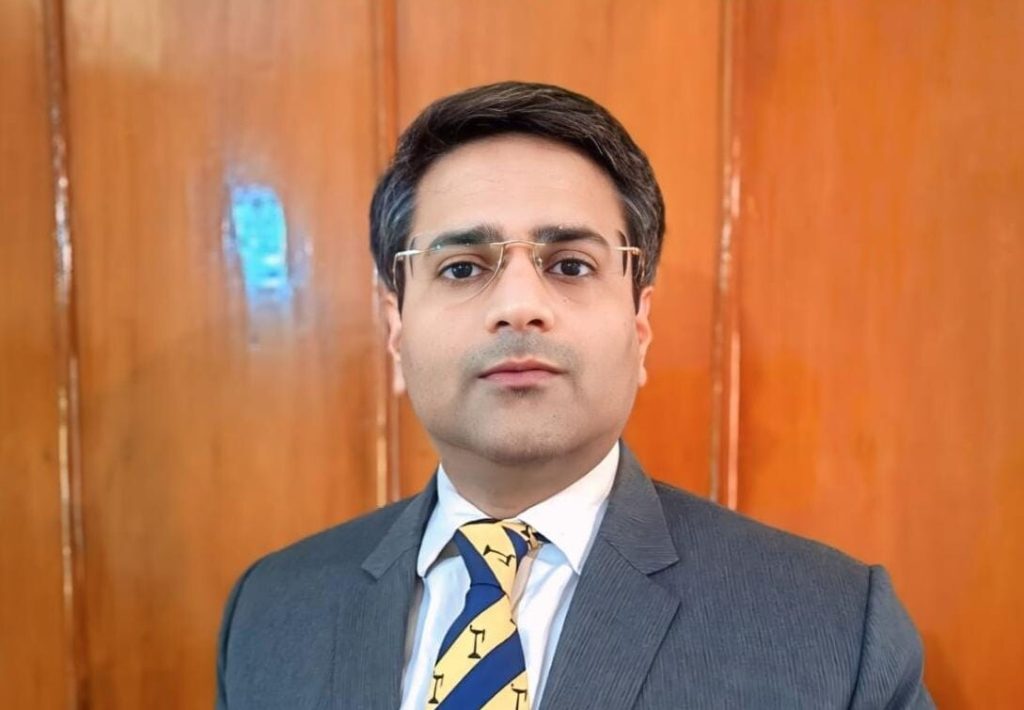This interview has been published by Anshi Mudgal and The SuperLawyer Team
Coming from a family deeply rooted in public service, what inspired you to chart a different path as a first-generation advocate, and how has your family’s background in public service influenced your perspective as a lawyer?
Since childhood I had seen my parents being posted at different places in the State of U.P. I soon also realized how demanding their work was. There were times when both parents found it difficult to even make it for school events like parent teacher meetings or the Annual Founder’s Day Programme. As I grew older and came close to choosing a career, I was certain that I did not want to join the administrative services as I found them to be very demanding, unpredictable and not free from external pressures.
I chose to study the law because I knew with it, I would be empowered, independent and in a position to make a meaningful difference. Initially like most joining an NLU I too had dreams of working in a law firm but that was extremely short lived and after having interned in Courts and seen advocates make submissions, I found litigation quite attractive. I still remember as a young intern having seen Late Mr. Fali Nariman argue a matter before the Supreme Court for an entire day- though I understood little of it then but it left a lasting impact on me which only got further cemented during the course of my subsequent litigation internships.
My family’s background in public service has significantly influenced my perspective of the law. Having heard accounts from my father of his experiences from the times when he was a City Magistrate in Allahabad (now Prayagraj) till he retired as a Special Secretary, and incidents from the time of my grandfather, who was the first Director General of Police U.P., I expected and continue to expect officers to have high standards in administration and in the discharge of their functions. Often these expectations have not been and are not met. I firmly believe in the separation of powers and the fact that the executive is primarily there to ensure the welfare of the people as per the law of the land and it should never exceed its jurisdiction or arrogate to itself powers which the law otherwise does not confer on it.
In the early phases of your career, what were the defining instances that shaped your understanding of the law, and which experiences do you still hold close to your heart today?
Law as we learn it in the classrooms is very different from how it is applied in Courts. Also, litigation is not just contingent upon the understanding of the law but in my opinion, it also has got to do with understanding of the process of the law or in other words how it unfurls in the courtroom and ultimately applies to real life situations in the form of an order or a decision. The proverb ‘There’s many a slip ‘twixt the cup and the lip’ applies best to litigation. Often it happens that one comes across a brief and after perusing it thinks that it is simple enough in the sense that the law applicable is clear and there could be only one way it could be decided. However, often to one’s surprise the decision might be the exact opposite. The Court may have proceeded on a consideration which was not only not anticipated by the counsel but perhaps seemed least relevant.
An interesting incident happened with me early on in my practice. We had filed an application for recalling an ex-parte order of transferring the case from one district to another in favour of the wife. After a long and heated hearing the application for recall was dismissed and to my dismay without dealing with the main argument which I thought was the sheet anchor. However, the Hon’ble Judge was kind enough to tell me later that one can never get an order by fighting with the Court, no matter how meritorious one might think his/her case is, and the secret lay in calmly but repeatedly urging the Court to accept your point of view. What I also realized later was that it was always better to get a rough idea of the Judge’s view on the subject matter before one goes for the hearing, one should be prepared to the hilt and anticipate anything and everything and one should always while putting one’s case across be in a position to provide a plausible solution to the Court.
You have been empaneled with the Allahabad High Court Legal Services Sub-Committee. What are the different challenges involved in this role, and what responsibilities does it bring with it?
My work with the Allahabad High Court Legal Services Sub-Committee has essentially revolved around filing and appearing in matters, mostly criminal appeals and bails, of convicts and under-trials who have not been able to engage a counsel independently by their own means. The fact that this work not only directly affects the life and liberty of the litigants but also requires representation of underprivileged litigants makes it extremely sensitive. I always try to ensure that this work is done on a priority basis and is given equal if not more importance than other regular matters of the chamber.
What has been the most memorable or challenging case in your litigation career, and how did it shape your approach to handling complex legal disputes?
The most memorable case that I have worked on till now was a writ petition that we had filed before the Lucknow bench of the Allahabad High Court at the behest of the informant, in an FIR, challenging the transfer of the investigation from the State Police to the CBI.
In most cases it is the informant who seeks transfer of the case from the local police to the CBI and approaches the Court for such directions. However, in this case what we wanted was the exact opposite. The informant had lodged an FIR under the prevention of Corruption Act against an extremely high-ranking and resourceful individual involved in the administration of a State University. The State police had made significant progress and was at the verge of filing a chargesheet against the accused, though they had not been able to arrest the primary accused, and all of a sudden notifications were issued by the State and Central Government transferring the investigation to the CBI.
This transfer was not at the request of the informant.
The informant then preferred a petition before the Lucknow Bench of the Allahabad High Court praying for quashing of these notifications amongst other reliefs as he wanted the State police to complete the investigation which was anyway at its last leg. The petition, as drafted, addressed questions of Constitutional law ranging from Federalism to exercise of powers by the President and the Governor, the necessity for such action, its procedural and substantive limitations and internal procedures that had to be followed by the Ministries and Departments concerned.
It was a task to keep the petition getting listed and taken up on different dates because it was a race against time as the investigation had already been transferred to the CBI. This matter not only exposed me to engaging aspects of Constitutional law but also gave a glimpse of ingenious and crucial strategies advocates from both sides employ to anticipate the next move and to finally win. I became aware of several tricks of the profession which otherwise I was unbeknownst of. The petition was ultimately dismissed by the High Court and so was the SLP. Thereafter an interesting event occurred. Some months after the dismissal of the petition, the informant was arrested by a Central Government investigating agency in relation to some offence pertaining to marksheets of students of another State University. I believe the informant is still in jail and the matter in which he is now an accused is sub-judice.
I would say that in handling complex legal disputes my approach still remains mostly the same. One is required to research thoroughly, draft well, observe the benches and put one’s best foot forward. One however, in high stake matters, has to be weary and mindful, for the purposes of strategy, of what is happening around the matter especially if the matter is of a political nature or concerns important people. In such cases information and the timing of the information is extremely crucial and can make or break situations.
There is a lot of information and also misinformation and sometimes things seem to be pulling you in all directions and you really don’t know how to plan ahead. What is therefore required is to keep a level head, a fearless and extremely professional attitude towards things and perhaps the guidance of someone trustworthy who has more years than you behind him in the profession. One must always give one’s best with the resources at one’s disposal and not worry about the result.
The last and most important thing that I took away from this matter was that one should never take things personally and not have an emotional reaction to things. With this particular matter I was extremely fortunate to have the guidance and wisdom of my seniors from the bar at Lucknow and Allahabad. They guided me through what I think was a difficult terrain of dilemmas and decisions.
In your experience appearing before various courts and tribunals, what strategies or principles have you found most effective in managing high-stakes litigation?
In my opinion in high stake litigation, one has to be extremely mindful of time. Since these matters are extremely sensitive often due to the imminent threat and irreparable consequences. Even a few hours of delay can have disastrous consequences. Take the demolition of a property for example. There have been instances of petitions being heard while the local administration is already at the doorstep with bulldozers. One should be in a position to multi-task and move with lightning speed and take chances even if the odds don’t seem favourable.
I recall a matter in which a part of the house of a litigant was being demolished for the operationalization of an airport and the matter had been listed on some other future date. By the time that date would’ve come the authorities would have very easily and conveniently demolished the property. Given the immediate nature of the threat, after a short discussion with a colleague who was also a co-counsel in the matter, we decided to mention the matter before the Court and make a request for the hearing to be advanced to that very day and for it to be taken up.
We thought that the chances of success were rather slim and the Court would turn down the request but we still wanted to give it a shot. To our surprise the Court accepted the mention and summoned the file. What followed was a quick trip to the office of the Registrar and the section, written intimations to other counsels culminating in a stay order against the demolition.
Another important strategy in high stake matters, especially with voluminous paperwork, is to simplify the matter as much as one can for the convenience of the Court. Most Courts are burdened with work and often do not find time to go through hundreds of pages unless the matter is at the stage of final hearing. For the purposes of interim relief, I think it’s best to very succinctly put across the illegality in the impugned action at the start of the submission and then follow up with facts as and when they are needed. The strongest point which hits the core of illegality should be put across earliest, avoiding verbiage. Obviously, what that point is and how it has to be put across is a thing to be learnt over time. Hitting the nail on the head is crucial and arguments have to be honed and distilled for this purpose. I have had seniors tell me that if a petition has too many grounds then it essentially means that there are no grounds worth taking. I think the same applies to submissions.
I have also found that in some important matters the responding side may want to delay the interim relief on some pretext or the other. Delay often results in denial for all practical purposes. Therefore, one has to be vigilant and tie up as many loose ends as one can. Serving of advance notices wherever possible, getting matters listed early or peremptorily on the board or getting a time fixed for hearing on a given day, making mentions and in the odd event getting proactive directions from superior courts are some measures one can adopt to ensure effective prosecution of one’s case.
Having appeared before multiple forums, High Courts, Arbitral Tribunals, Consumer Forums, and Industrial Tribunals what strategies do you adopt to adapt your advocacy style depending on the forum?
Sun Tzu in the Art of War has said that “If you know the enemy and know yourself, you need not fear the result of a hundred battles….”. Court hearings are obviously not like battles and the Judge is never an enemy but it never harms one to know what one is going to be faced with. Therefore, I believe it is imperative to know and understand the turf before one gets onto it. Different forums have different ways of functioning and adopt different procedures of doing the same thing. It is therefore crucial that one understands the procedures of the place where one is appearing.
The second aspect would be to understand the manner of functioning of the Judge or what people call reading the judge or reading the bench. Some Judges are more inclined towards equity while some prefer the dead cold letter of the law and apply it as it is. Some prefer long drawn arguments while some prefer that one straightaway comes to the main point. One therefore has to mould the manner of argument as per the nature of the Judge. Understanding the nature of the Judge helps you structure not only the arguments but also the manner in which you would want your case to proceed and avoid possible pitfalls.
With over a decade of diverse practice and multiple empanelments, what professional values have guided you throughout your journey, and what advice would you give young aspirants on building a career like yours while balancing professional commitments with personal life?
I have always endeavoured to maintain my integrity and be honest with the Court. I have always advised litigants to adopt ethical means in the process of adjudication before the Courts and I don’t hesitate from saying that that has cost me work. I believe that at the end of the day it is a person’s integrity and reputation that matters most and as long as his/her conscience is clear nothing else really matters. Apart from joining a good chamber my advice to young aspirants would be to maintain a strong work ethic and to always keep their eyes and ears open as one learns most through observation. One must always keep the company of colleagues and seniors who are similarly aligned in their objectives and hold similar if not the same value system and imbibe not only knowledge and wisdom but also desired professional values. A good part of the initial years should be spent in learning and thereafter the focus should be on procurement of work. Since the journey of a litigating lawyer is long and arduous one should, as a matter of habit, definitely take out time for family, friends and oneself as work never ends.
Get in touch with Rajat Gangwar –




No comment provided.
In his interview, this young boy is very honest about his line of work and his potential to reach the Supreme Court
No comment provided.
I am so proud to see your journey and the values you hold as a lawyer. Your dedication, integrity, and commitment to justice truly shine through. Wishing you many more milestones and continued success ahead.
Very well said Rajat!
I know him personally and we are practicing at same court. He is doing extraordinary and through blog I knew a lot about him.